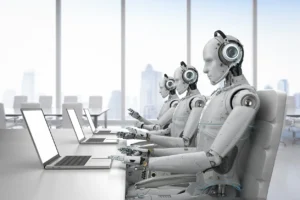One of the most revolutionary developments in the contemporary world is artificial intelligence . AI is not just a fad; it is a fundamental component of the future, transforming everything from industries to social standards. This article explores the history, uses, moral dilemmas, and Rise of artificial intelligence, providing a thorough overview of how this technology is influencing our daily lives.

The Genesis of AI
When pioneers like Alan Turing and John McCarthy started investigating the prospect of machines imitating human intelligence in the middle of the 20th century, the idea of artificial intelligence was born. Years of study and advancement were sparked by Turing’s seminal query, “Can machines think?” Early AI systems, which were mainly concerned with problem-solving and logic-based thinking, were made possible by the development of computers that could process enormous volumes of data.
Artificial intelligence has advanced from theoretical frameworks to practical applications in the twenty-first century thanks to developments in computing power, data storage, and algorithm design. A subset of artificial intelligence called machine learning has gained significant traction because it allows systems to learn from experience and get better without explicit programming.
Applications Across Industries for Rise of AI
Artificial intelligence has an impact on almost every industry, promoting productivity, creativity, and efficiency. The following are some noteworthy industries where artificial intelligence is having a big impact:
-
Healthcare
AI-driven technologies are transforming patient care, treatment planning, and diagnosis. For example, machine learning systems use medical image analysis to accurately identify abnormalities like tumors. Predictive analytics aids medical professionals in anticipating illness outbreaks, and AI-powered virtual assistants offer tailored health advice.
-
Finance
Artificial intelligence is improving risk assessment, investing strategies, and fraud detection in the financial industry. In order to provide real-time trading insights, algorithms examine past data and market trends. Additionally, automated customer support systems and chatbots are enhancing customer relations and operational effectiveness.
-
Transportation
Transportation is being redefined by AI-enhanced logistical systems and self-driving automobiles. AI is used by autonomous cars to decipher sensor data and traverse challenging terrain. Artificial intelligence, meanwhile, streamlines supply chain processes, cutting expenses and speeding up delivery.
-
Education
AI is revolutionizing education by making individualized learning possible. While natural language processing techniques help with content production and grading, intelligent tutoring systems adjust to the demands of each individual learner. AI-powered virtual classrooms are removing geographical restrictions and increasing access to education.
-
Entertainment
The entertainment sector is adopting AI to boost creativity and consumer engagement in everything from AI-generated music and art to content recommendations on streaming platforms. AI is being used by video game creators to produce more dynamic and engaging gaming experiences.
-
Agriculture
Precision farming, crop monitoring, and predictive analytics for yield optimization are a few examples of AI applications in agriculture. AI-powered drones and sensors assist farmers in making data-driven decisions, which lowers resource waste and boosts output.
Ethical and Societal Considerations
While the benefits of AI are undeniable, its rapid advancement raises several ethical and societal concerns. These include:
-
Bias and Fairness
AI systems are only as unbiased as the data they are trained on. Biased data can lead to discriminatory outcomes in applications such as hiring, law enforcement, and lending. Ensuring fairness and accountability in artificial intelligence decision-making is a critical challenge.
-
Privacy
Because artificial intelligence depends on large datasets, it frequently gathers and examines personal data. This brings up issues with data privacy and the possibility of sensitive data being misused. It’s critical to strike a balance between privacy protection and innovation.
-
Job Displacement
AI-driven automation poses a danger to jobs in a number of industries, especially those that require repeated work. Although AI opens up new possibilities, the shift necessitates that workers retrain and upskill in order to adjust to shifting labor markets.
-
Accountability
Concerns regarding responsibility in the event of mistakes or failures arise as AI systems get more independent. It is essential to create precise legal and moral frameworks to deal with these problems.
-
Security
Malicious uses of AI as a weapon include hacks, disinformation campaigns, and autonomous weapons. Creating strong defenses against this kind of abuse is essential to preserving international security.
The Road Ahead in Rise of AI

The future of AI holds immense promise, with potential breakthroughs poised to redefine human capabilities and experiences. Key trends shaping the evolution of AI include:
-
Explainable AI
Making sure AI systems are transparent and interpretable is essential as they grow more complicated. By making AI decision-making processes intelligible to people, explainable AI seeks to promote responsibility and trust.
-
AI and Sustainability
When it comes to solving global issues like resource management and climate change, artificial intelligence can be extremely important. A sustainable future is being ushered in by energy-efficient technologies, smart grids, and AI-powered conservation initiatives.
-
Human-AI Collaboration
The future of artificial intelligence is collaboration, not human replacement. In domains including healthcare, education, and the creative industries, augmented intelligence—where artificial intelligence improves human decision-making—is growing in popularity.
-
Ethical AI Development
It is crucial to incorporate ethical considerations into AI development as it continues to advance. Governments and organizations are developing policies and rules to guarantee artificial intelligence advances humanity while lowering hazards.
-
Quantum artificial intelligence
The convergence of quantum computing and artificial intelligence has the potential to solve problems previously deemed intractable. This synergy could revolutionize fields like drug discovery, cryptography, and complex system modeling.
Conclusion
Unquestionably, artificial intelligence is influencing the future by presenting previously unheard-of possibilities and difficulties. A balanced strategy that welcomes innovation while tackling moral and societal issues is crucial as we traverse this revolutionary era. We can use artificial intelligence to build a future that is not only technologically sophisticated but also just and sustainable if we encourage cooperation between technologists, legislators, and the international community.
For more details follow us up on https://www.instagram.com/
and https://saniyajailink.com/